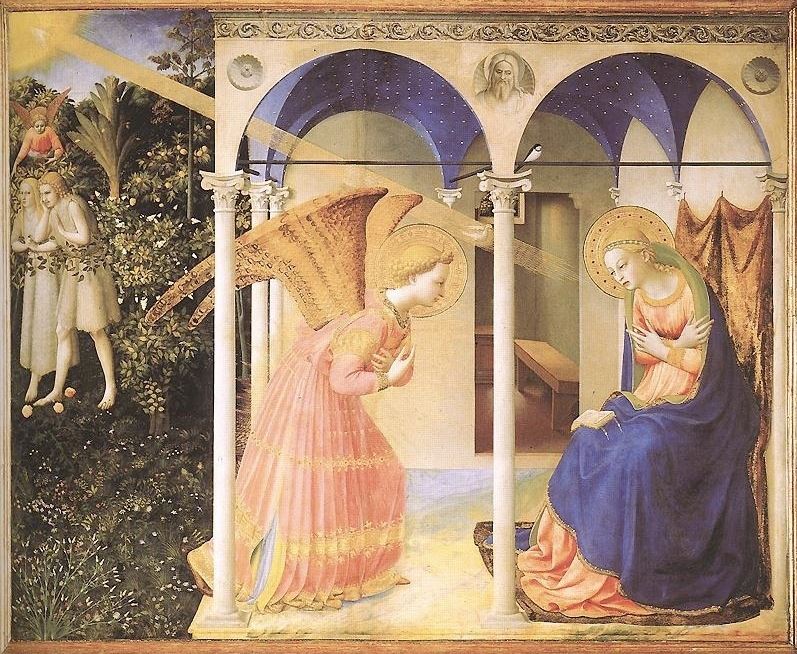The vocation to love, part 4: The call of Mary
Luke’s Gospel begins with two stories of vocation: of John the Baptist through his father, Zechariah, and of Mary to be mother of Jesus. John is a link between the Old Testament and the New. His call before his birth, like his dress, food and manner of life, reminds us of the Old Testament prophets.
The call of Mary also has Old Testament echoes, especially of Hannah, the mother of Samuel. But with Mary comes something radically new. This is powerfully symbolised by her virginal conception: the power of God breaks directly into the human world. In the baby she conceives, ‘God is with us.’
It is very common to use the Annunciation as a moral example. The point, people usually say, is Mary’s obedience; and her obedience is understood as choosing to do what God asks. St Bernard went so far as to imagine the whole world hanging on to her lips, waiting for her answer: ‘What if she says, “No”?’
A closer reading of the text suggests something different. The angel does not say, ‘This is God’s suggestion. Are you agreeable to it?’ Gabriel’s words are, ‘you will conceive in your womb and bear a son, and you shall call his name Jesus.’ No ifs or buts or perhapses. When Mary embraces God’s will, she is not choosing one of a set of options. She is putting her whole self into welcoming what is to come. It is less like a choice of vocation than a discovery. This is what will happen – this is what God wants – this is what is good – this is what is good for me – this is what I want. It is as if all these different ways of putting it come to the same thing.
The Annunciation is a modest little feast: it sometimes even gets shunted onto different dates by Easter. Yet it commemorates the most radically new moment in the history of the human race, more so even than Easter. This was the moment when God became man. It was slipped quietly into the ordinary life of a seemingly ordinary young lass in little insignificant Palestine. The calls that each of you too have heard or will hear – to a certain type of work, to a certain way of life – will usually be hidden from the public eye. Yet if you respond, they will transform your lives. Take them all together, and they will transform the world.
Click here to see other ‘Vocation to Love’ articles in this series by Sr Margaret.
Tags: Annunciation, featured, Mary, vocation-to-love


















I’m worried this implies Mary was not free! A kind of predestination. Yes, it fits with some of the texts about prophetic calls (not much choice there!). But theologically/existentially/anthropologically I just can’t fathom Mary not having a reciprocal element in this conversation. You focus on the ‘you shalt conceive…’ but not on the ‘Fiat’. Isn’t the whole tradition of ‘Fiat’ that Mary’s response was part of the unfolding of this miracle? That her Fiat counter-mirrored Eve’s No? And the language of spouse of the Holy Spirit seems to me to bear witness to an element of freedom. Perhaps this is a key, Mary’s spousal role.
What you describe (‘this is where you will be, this is your future’) is what God says to all of us about our life with him in Heaven, our ultimate vocation; and yet there are still people who say ‘No thanks’. This is the mystery – the sense of a destiny (which is much more than a ‘free choice’ as you rightly say) but a destiny which we can still deny.
I thought about this post much.
The more I think about Stephens comment ~ the more I think that Mary’s ‘choice’ was not in her initial Yes to God. She had No Choice in what was bestowed upon her. Just like in your earlier homily Stephen ~ when you said we do not choose ourselves, who we are.
Her Fiat of yes was surely the Yes in the way that she lived out That that was bestowed upon her. The Yes of Grace.
She had a Choice to carry her child with Love, with faith, with hope, with joy, with kindness, with nurture etc. She also had a choice not to. Her Fiat was surely the Grace to respond completely in absolute Love, to Gods Will.